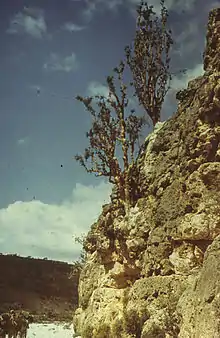Boswellia frereana
Boswellia frereana is a species of plant native to Somaliland [1][2][3][4] where the locals call it "Dhidin" or "Maydi" (other spellings include: Meydi, Meyti, Maidi, Maieti, and Mayeti) or the king of all frankincense. It is also known as the Yigaar (or Yegaar) tree [3] and by the common name for all frankincense, Luban.[5] The epithet is named after William Edward Frere, Member of Council at Bombay.[6]
| Boswellia frereana | |
|---|---|
 | |
| Scientific classification | |
| Kingdom: | Plantae |
| Clade: | Tracheophytes |
| Clade: | Angiosperms |
| Clade: | Eudicots |
| Clade: | Rosids |
| Order: | Sapindales |
| Family: | Burseraceae |
| Genus: | Boswellia |
| Species: | B. frereana |
| Binomial name | |
| Boswellia frereana | |
Other than its aromatic uses, the locals also use it for medicinal purposes; they make it into a paste called "malmal" and apply it on the joints to treat inflammation and arthritis.[7] It is reported to be cultivated in Yemen,[8] but this could be based on an 1870 record by Dr. G. Birdwood citing that B. frereana was seen in Sir Robert Playfair's garden in Aden (Yemen). Playfair had brought B. frereana from Somalia and cultivated it in his garden in Aden. Although rumored to also grow in Oman, scientific and botanical evidence does not confirm that B. frereana either grows or is cultivated there.[1][2][3][4][7][9][10] B. frereana resin, however, is very rarely found in Omani markets in the larger cities as a less expensive and more palatable chewing resin compared to the native Omani frankincense, B. sacra, which is known more for its medicinal and aromatic properties.
In the West B. frereana is called "Coptic Frankincense" as this is the type and grade used by the Coptic Church of Egypt. 80% of B. frereana production is sold to Saudi Arabia where it is traditionally brought home by Muslim pilgrims. The remaining 20% is sold all around the world.
References
- Hepper, F. Nigel (1969). "Arabian and African Frankincense Trees". Journal of Egyptian Archaeology. 55: 66–72. doi:10.2307/3856001. JSTOR 3856001.
- Thulin, M.; Warfa, A. M. (1987). "The frankincense trees (Boswellia spp., Burceraceae) of northern Somalia and southern Arabia". Kew Bulletin. 42 (3): 487–500. doi:10.2307/4110063. JSTOR 4110063.
- Tucker, Arthur O. (1986). "Frankincense and myrrh". Economic Botany. 40 (4): 425–433. doi:10.1007/BF02859654. S2CID 12460227.
- Thulin, M. "BOSWELLIA frereana Birdw. [family BURSERACEAE]". Flora Somalia, Vol 2, (1999) [updated 2008]. Royal Botanic Gardens, Kew.
- Gopalan (June 23, 2011). "West Learns Utility Of Frankincense From Somalis". Medindia.
- Polo, Marco (1993). Cordier, Henri (ed.). The Travels of Marco Polo: The Complete Yule-Cordier Edition. Translated by Yule, Henry. New York: Courier Corporation. p. 448. ISBN 9780486275871.
- Birdwood, George (1870). "III. On the genus Boswellia, with descriptions and figures of three new species". Transactions of the Linnean Society of London. 27 (2): 111–148. doi:10.1111/j.1096-3642.1870.tb00205.x.
- "Boswellia frereana". Germplasm Resources Information Network (GRIN). Agricultural Research Service (ARS), United States Department of Agriculture (USDA). Retrieved 25 January 2018.
- Miller, A.G. and M. Morris. 1988. Plants of Dhofar. Government of Oman. ISBN 0-7157-0808-2.
- Hunter, F.M. 1877. An Account of the British Settlement of Aden in Arabia by Captain F.M. Hunter, London, p. 113.